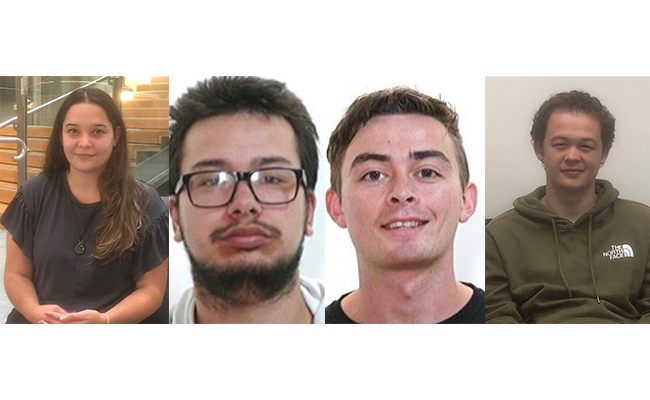
Otago Business School students Sequoia Short, Tahu Andrell, Ben Kiore and Laurie Lloyd-Jones.
While some of us were relaxing on the beach, four Otago Business School students spent their summer as scholarship recipients, getting a real taste of Māori business.
Organised through Otago Business School Associate Dean Māori, Dr Katharina Ruckstuhl, the scholarships give a 'real-world' research experience with a Māori business.
“It's really important that our students get an understanding of the $70 billion Māori economy,” Dr Ruckstuhl says. “Whether our Māori students are going onto a master's or PhD, or out into the workforce, developing insight into the realities for Māori businesses is a key aim of the scholarship.”
“I have found my time at the University amazing. I'm the first person from my family to ever go to university, so I didn't come here with high personal expectations. The student experience was 100 per cent and the pastoral care from the Māori student support services has helped me reach my potential to undertake a PhD.”
This year, students from the Management, Accounting and Finance, and Economics Departments worked with Aukaha, a Ngāi Tahu Rūnanga consultancy based in Dunedin. The other student from Information Science worked with Awarua Rūnanga in Bluff.
Master's in Sustainable Business student, Sequoia Short (Ngāti Apakura, Ngāti Toa, Ngāti Mutunga, and Ngāti Rārua), spent her summer working with Aukaha, researching social procurement.
“For me it was a really great way to get in touch with local Māori communities and to do research that benefits people directly.
“This project gave me the opportunity to apply what I had learned during the year in my course in a very tangible way. It's easy to come from a student perspective and see the problems that affect you, but getting out into the community and seeing what those wider problems are that you might not see in your everyday life was very interesting,” she says.
Sequoia intends to undertake a PhD based on her research with Aukaha. “I think the most valuable part for me was developing new connections and networks that will be super-helpful for me in my future study and future work.
“I have found my time at the University amazing. I'm the first person from my family to ever go to university, so I didn't come here with high personal expectations. The student experience was 100 per cent and the pastoral care from the Māori student support services has helped me reach my potential to undertake a PhD.”
Information Science honours student Laurie Lloyd-Jones (Tuhoe) thoroughly enjoyed working with Awarua Rūnanga at Te Rau Aroha Marae in Bluff.
He was part of a virtual reality (VR) project, Ātea, involving collaborators from around the country that is investigating how marae communities can communicate with each other through VR technology.
Originally from Whakatū/Nelson, Laurie spent the previous summer at Māori software company, Plink, developing an app to teach te reo Māori in schools. So the Ātea project was a natural progression in his research career.
“For this year's honours project I plan to look at how to use VR to help those who are nervous to go on to a marae. This is because we got feedback at Bluff that many people are unsure what to do as they don't know marae protocol. So, the project will mainly focus on the pōwhiri or welcome.”
Laurie is taking a Māori language course this semester to boost his knowledge. He's also working with experts who can advise him on Māori protocol. He's not sure what his future holds, but he hopes to be able to give back to his Tūhoe iwi.
Two other students also worked with Aukaha. Ben Kiore (Ngāti Maniapoto), who has since gone on to a business advisory role with BDO, developed a business planning strategy. Ben had to give a presentation to the Aukaha finance committee, which was very well received.
Master's of Economics student, Tahu Andrell (Ngāi Tahu, Rangitane), was developing a business survey aimed at understanding the skills and needs of small Māori businesses in the summer. The project is still ongoing.
